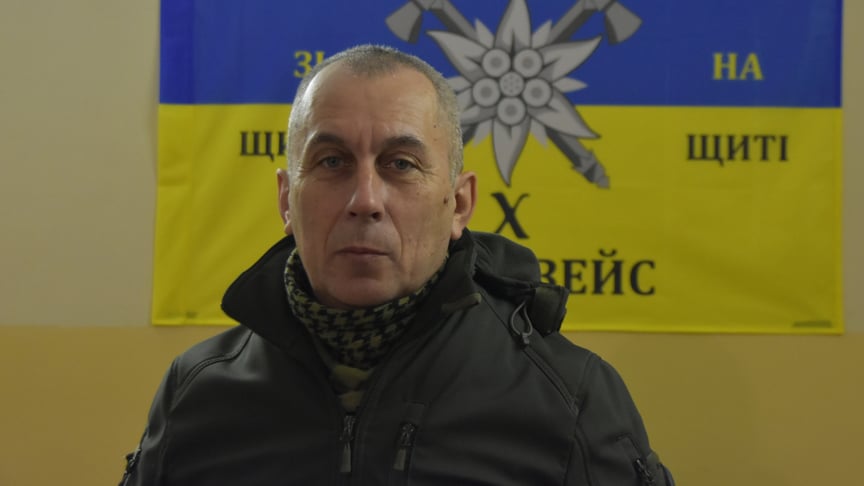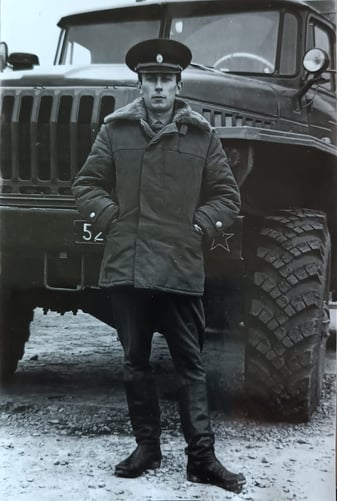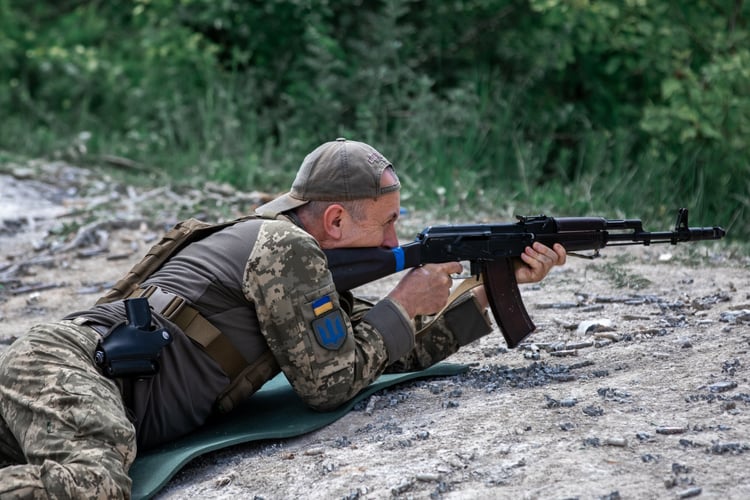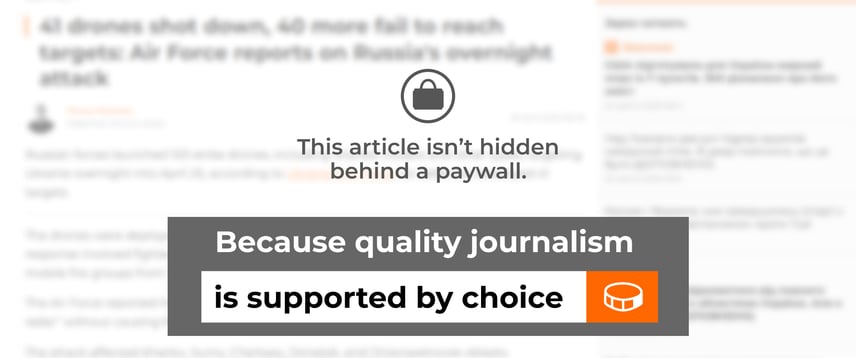Two oaths and officer honour: Soviet army's transformation into Ukraine's military

Have you ever wondered why Russians who served in the Soviet army on Ukrainian territory didn't stage an armed revolt after Ukraine declared independence? There were a lot of them: according to the General Staff of the Armed Forces of Ukraine, as of 1990, nearly 75% of officers in the Ukrainian SSR were ethnic Russians.
And have you ever been moved by the fact that after December 6, 1991, in military units from the Carpathians to Slobozhanshchyna, there were people who stepped under the yellow-and-blue flag and took an oath of allegiance to the people of Ukraine?
How did the Soviet army on Ukrainian territory transform into Ukraine's national Armed Forces? What changes were happening then in the conscience of its officers?
We talk about this with Major Viktor Susol of the Armed Forces of Ukraine. In 1986, he began his service in the Soviet Arctic. For him, the son of a district committee worker of the Communist Party of the Soviet Union, a graduate of a Soviet military-political school, a political officer in the Soviet army, the path to conscious Ukrainian identity was not easy. Now, at 60, Major Susol is an officer in the 10th Separate Mountain Assault Brigade of the Armed Forces of Ukraine "Edelweiss."
I believed the propaganda
Viktor was born in Ternopil Oblast. A Soviet child, he firmly believed he lived in the best country in the world. He finished school in 1982.
“At that time, Soviet troops were already in Afghanistan. I saw fulfilling the international duty as a great honor. And I wasn't afraid to enter a military school because of the war in Afghanistan. It was only later that I understood that the Soviet army was essentially an occupier in Afghanistan. But back then, I believed the propaganda. There was some kind of youthful naivety, faith in Soviet ideals,” Susol recalls.
He didn't think about the fact that in 1939, the Soviet army was an occupier for his native Ternopil Oblast, too. At home, the family didn't talk about it, not even his grandfather and grandmother, who lived in a Volyn village. In his town, there was a street named after the events of September 17—for him, it meant the joy of reuniting Western and Soviet Ukraine, not Soviet occupation at all.
“Only later, during Gorbachev's perestroika, when I could read the relevant literature, did I realize that on September 17, 1939, the USSR essentially annexed Western Ukraine,” Viktor says.
In 1982, he became a cadet at the Simferopol Military-Political Construction School, which trained zampolits for construction troops.
In college, Viktor became a member of the CPSU—a graduate of a military-political school, in order to take a position as a political officer in the army, had to be a party member. Otherwise, he would have to serve as a simple platoon leader.
He was on track for a red diploma, which meant he had the right to choose his future place of service. His uncle, a military man, recommended asking for the Far East or the Far North. He said, while you're unmarried, serve a few years in tough conditions. And then it will be easier to return to service in Ukraine.
“To give you an idea, out of 28 officers in my training platoon, only two were able to stay in Ukraine. I went to Vorkuta. It was 1986,” Viktor says.
A few blows to the brain
His subordinates built military airfields, and he, the zampolit, told them about “socialism with a human face” and the advantages of the Soviet way of life.
A few years passed in this service. And the People's Movement had already emerged, which, under the influence of the Afghan war, started saying that Ukrainian boys should serve their conscript service only in Ukraine. The movement was supported by organizations of soldiers' mothers. Viktor, in the Russian Arctic, knew nothing about this. In letters, he didn't ask relatives about events in Ukraine—out of caution, because who knows whose hands those letters might fall into. Calling home was problematic—the Vorkuta communications hub opened the line to western Ukraine only from 2 a.m. to 6 a.m.
But in the Arctic vacuum, his Soviet convictions were shaken for the first time. Next to Viktor in the unit served Lithuanian officers who passionately supported their “Sąjūdis”—the Lithuanian political movement that in the late 1980s advocated for the restoration of Lithuania's independence.
“They told me they were against the CPSU, that the Soviet Union had stolen Lithuania's independence, that the USSR was an occupier in relation to Lithuania. I was very interested; I even dreamed of going to Lithuania to see how people lived there. At the same time, the thought appeared that such a small republic—well, what could it do against the USSR? The USSR would send in troops—and that would be it, no independence for Lithuania, only blood would be spilled. I talked to the Lithuanians about this, too. And they told me a very interesting thing. That even if there are no chances, everyone should fight for independence because it's worth it. I felt that they thought completely differently from me, an ordinary Soviet citizen,” Viktor recounts.
And then the Lithuanian officers went on leave—and didn't return to the unit. Usually, deserters were searched for throughout the USSR. And Viktor thought the Lithuanians would be searched for, too. He even worried that they would send him after them. But no one was sent! Viktor was very surprised by the command's weak reaction. And then, for perhaps the first time, doubt crept in about the capabilities of the Soviet army and the USSR itself.
… During his service in the Arctic, he had to travel a lot around the country on business trips. He realized that the picture of real Soviet life was very different from the one painted for him in school and at the academy.
“I saw the standard of living of people in Siberia, Central Asia, the Russian hinterland—and an impression began to form that in our country, life wasn't as good as they said, the friendship of peoples wasn't as I was used to thinking.”
And during his service in Russia, he realized that Ukrainians and Russians are not one people at all. The first bell rang when, after a year of service in Vorkuta, he was going on leave to his parents. The train, having crossed Russia, rolled through Ukraine's Sumy Oblast—and Viktor felt a stark contrast in the culture of life with the Russian hinterland. Then again: he ended up in a polar settlement where descendants of former prisoners and people deported to the North in Stalin's time lived. He saw the neat, self-built homes of Ukrainians and Volga Germans. And the old prison barracks where Russians lived. Among those barracks, the driver drove very slowly—it was Saturday, and he had to watch out for drunk Russians. The driver explained that he was afraid of running over a drunk child, but most of all—of running over a dog, because for that, they might shoot at the cab with a shotgun…
At that time, books that had once been banned by Soviet censorship began to appear, and Viktor devoured them thirstily—like a hungry person eats food… He says that from Solzhenitsyn’s The Gulag Archipelago, he felt his brain explode. Then another explosion—from Mykhailo Hrushevsky's History of Ukraine-Rus'. Viktor was reading an unpoliticized, non-Soviet history of his people for the first time.
… By that time, the army manuals for political classes had already changed. They now talked about Stalinist repressions, political prisoners, some mistakes of the CPSU, and the need to correct them.
“I spoke then at political classes about cleansing the party, about new prospects for the Soviet state. I felt that perestroika was happening in me myself, I had already begun to critically perceive both the past of the USSR and current events,” the man recalls.
Viktor earned very well in the Arctic—650 rubles a month was a huge sum for a Soviet person at the time. The stores in the Arctic military trade had everything except bird's milk chocolates. Meanwhile, Viktor's classmate, who served in Mukachevo, received barely more than 220 rubles. And the military trade in Ukraine couldn't compensate for the general shortage of goods. And even Viktor's parents started talking about the country moving in the wrong direction. And in his native, so provincial town, spontaneous gatherings of people dissatisfied with salaries and goods arose. In Ukraine, things were already boiling—it was heading toward the Revolution on Granite.
But Viktor still really wanted to return to Ukraine from his sleepy Arctic prosperity.
“By that time, I was already married, had a child, had seen enough of Russian life. And the last thing I wanted was for my family to live in Russia,” he says.
He managed to “get out of” service in Russia's Engels—to build that very airfield that the Armed Forces of Ukraine are now bombing so accurately. He tried to avoid service with a big promotion in Uzbekistan. And he put in a whole lot of effort to transfer at the end of 1990 to service in his and his wife's native Ternopil Oblast—to a training brigade that prepared cadres for engineering brigades stationed in Russia.
Ukrainian flag on a Soviet tunic
Officers in the brigade at that time included Ukrainians, Russians, and Belarusians. Conscripts were brought from all corners of the USSR. According to Viktor, although no one spoke about it openly, everyone had a feeling that the Soviet Union wouldn't last long. For him, the political officer, it was hard in political classes: he thought one thing, said another.
“I had to wriggle out. It might not have been entirely pretty. But it was such a time when people said one thing, thought another, and did a third. The moods in the brigade were varied. There was anxiety and uncertainty. Two or three Russian officers had such chauvinistic Soviet views that it was impossible to talk to them. There was one Russian nationalist who spoke against the USSR. He said the USSR would fall apart and Russia and Ukraine would become independent states. We converged on this topic because by that time, I was also against the USSR. Under the lapel of my formal Soviet tunic, I wore the flag of Ukraine, and he—the Russian tricolor. And when greeting, we flipped back the lapels of our tunics, showing each other the flags. By then, I had already moved into the category of Ukrainian nationalists. I read newspapers with a nationalist orientation. True, I didn't bring them to political classes for the personnel; I wasn't bold enough for that,” Viktor recalls.
By the way, when he moved to service in Ukraine at the end of 1990, no one asked him, the political officer, about his party card anymore. And party meetings in the unit were no longer held.

Although a few officers served in the brigade who were absolutely convinced of the unshakability of the USSR, even they pondered the question: and how to act if the Union really does fall apart?
“Then the Union of Officers of Ukraine was organized. I was surprised that it was headed by an Armenian. But in the Union, people talked about the need to build a Ukrainian national army, and that appealed to me. I understood that in any scenario, I would stay to serve in Ukraine,” the serviceman recalls.
Viktor recounts that a few months before the declaration of Ukrainian independence, it became known that their training brigade was subject to disbandment. Officers began intensively resolving questions about their own future. Each tried to find a new place of service according to their political views and family circumstances. The then Ministry of Defense of the USSR offered officers from units stationed in Ukraine transfer to Russian territory with big (sometimes even two steps) promotions.
“I know a few Ukrainian officers from my brigade who agreed to such transfers and went to Russia. I know Belarusian and Russian officers who stayed in Ukraine. Everyone made their choice,” Major Susol says.
He remembers very well the tension and anxiety he experienced in August 1991, when the GKChP tried to seize power in the Soviet Union.
“But when all the TV channels showed the frightened GKChP members, whose hands were trembling, I realized that the Soviet system had rotted and degraded to such a level that it would definitely die—despite its military might and powerful propaganda apparatus. And then I finally understood that the Soviet Union was finished. And I perceived the declaration of independence on August 24 as an event that logically had to happen,” Viktor shares his memories.
He wasn't afraid that supporters of the USSR in Ukraine would raise the army against Ukrainian independence.
“I assessed the situation based on the state of affairs in my unit. At that time, about 70% of the officers were for independence. I understood that the situation was approximately the same in other units. That is, a military conflict couldn't arise a priori. Honestly, I was more afraid of conflicts on interethnic grounds—they happened in Georgia, Central Asia. But in our case, everything ended well then,” the major recounts.
After August 1991, he thanked himself a hundred times for having taken care of the transfer to Ukraine in advance. Because after the declaration of Ukrainian independence, Moscow was very reluctant to let Ukrainian officers go from its units to Ukraine: “They were offered promotions; when they refused—the command ‘lost’ their documents; sometimes it came to open threats and blackmail.”
Ukrainians — with Ukraine
On December 1, 1991, when Ukraine held a nationwide referendum on the declaration of Ukrainian independence, a closed polling station was organized in Viktor Susol's military unit. Viktor became its deputy head. He recalls:
“Our unit was being reduced then; about 100 personnel remained. And I remember that when counting the votes, only two or three votes were against Ukrainian independence. I don't know who it was.”
He also doesn't know if those officers came out in December 1991 to take the oath to the people of Ukraine. Possibly, because those officers who didn't want to serve in Ukraine had already left by then. Soldiers from Russia and other republics who served in the brigade were also sent home.
According to Viktor, at that time, in the officer environment, someone was constantly imposing demagogic discussions about how a real officer swears allegiance to the Fatherland only once, that the oath to Ukraine would be a violation of the previous oath—to the Soviet Union—and that this was unworthy of an officer's honor. But Ukrainian officers had their own ideas about honor.
“I remember some details of that winter day. The weather was frosty, and light snow was falling. We went out for a solemn formation. The brigade commander had gone to Russia; the new commander was our former chief of staff, a Ukrainian. He spoke well. I don't remember verbatim, but the sense was that the commander was glad that all who wanted to stay had stayed, that we, Ukrainians, are now together with Ukraine. We were still in Soviet military uniform, with stars on our caps; all the slogans and stands around were still written in Russian about the Soviet army. But there was already the Ukrainian flag and the anthem of Ukraine, and we took the oath of allegiance to the people of Ukraine,” Major Susol recalls that moment.
20 eggs and 6 cans of condensed milk per month
According to him, the change of uniform and symbols happened intensively starting from the beginning of 1992. That's when the army reform began. For the Armed Forces of Ukraine, it meant ruthless reduction of personnel and armaments. According to the General Staff of the Armed Forces of Ukraine, at the time of the declaration of independence, the number of troops in Ukraine was up to 900,000. And in December 1998, it was decided that the army must have 320,000 servicemembers and 100,000 workers. By the end of 2005, these figures were reduced to 185,000 and 65,000 people, respectively. In parallel, Ukraine was getting rid of its armaments.
After the disbandment of his brigade, Viktor Susol served at a base for storing engineering armaments and equipment in the village of Skala-Podilska. He says the situation in their unit was atypical: while the whole army was being reduced, they were looking for warrant officers and sergeants. After five years, Viktor Susol was transferred to service in the 820th Mechanized Regiment stationed in Mukachevo.
“The times were very hard. Basically, my family survived thanks to my food ration and my wife's self-employment—she, an engineer by profession, who in the Arctic worked in the technical department of my unit, organized a children's dance group and earned some money that way,” Viktor recalls the first years of service in independent Ukraine.
He still remembers very well the composition of his food ration at that time. Up to 3 kg of meat or the corresponding number of cans of stewed meat. 20 kg of potatoes, 1 kg of butter, 6 cans of condensed milk, 20 eggs, cereals.
“I knew that the military in Russia had better provisions then. But I didn't even consider the possibility of moving to Russia. Similarly, I wasn't going to quit the service. My wife reacted hard to the situation; there were quarrels, all sorts of things. I told her that maybe there wouldn't be much money as she was used to in the Arctic, but no state can do without its own army. So the difficulties are temporary; we just need to endure them. We had a tough life. But there were no problems with food,” Viktor says about his situation at the time.
His salary in 1996 was 4.5 million coupon-karbovanets (±$24). Two children. To continue his career in the army, it was necessary to enter a military academy. Viktor passed the exams, went through the attestation commission. The studies were to last two years—so he had to move his wife and children with him to Kyiv. But Viktor had to refuse the academy:
“We came with my wife to the capital—to get to know the accommodation, various household things. At the station, we went into a cafe—took coffee and nut pastries. For that, I had to pay 98,000. Almost 100,000. I calculated that 30 breakfasts a month—that's already 3 million. Just for breakfast for two! I went to the academy and took back my documents. This hit my career very hard. But I never regretted doing it that way.”
When the country switched to hryvnias, his salary reached 1,200 hryvnias per month ($636). “Not bombastic, but I could already afford some things,” the major comments. True, he didn't return to thoughts about entering the academy.
Viktor stayed in the army during the reductions of the 1990s. But the reductions of the early 2000s ended for him with retirement. At the age of 39.
“I was discharged because it hurt me a lot, everything that was happening in the army then. They gave away nuclear weapons, started cutting strategic bombers, missiles. Western partners pressured us, and we simply destroyed our military potential. In army matters, politicians proceeded from the fact that nothing threatens Ukraine militarily—so why does it need an army?! And this was all artificially fueled by Russia. Just think: as of the beginning of 2014, in our Donetsk Oblast, besides border guards, there were almost no troops. All our troops, according to the Soviet doctrine still, were concentrated in the western regions, against NATO countries. The military were told, ‘you're f*cking needed by no one, you just eat up state money—who are you going to fight?’ I had a feeling then of a big strategic mistake that our state was making.”
No more bosses and fools
Military pensioner Viktor Susol went into the advertising business. But his soul ached for the army. After 2014, he tried to return to military service. He understood that now not only the authorities but also ordinary Ukrainians had realized the importance of the army and that now the Armed Forces of Ukraine would finally start gaining strength. He asked for his former brigade—they didn't take him. They said his age was no longer suitable for the army. Then his father fell seriously ill, and family problems appeared…
And in 2020, Viktor met his former subordinate, who had managed to advance in service. He offered Major Susol a position in the command of the 10th Separate Mountain Assault Brigade "Edelweiss"—as an officer for moral-psychological support. And Viktor signed a three-year contract. Within the JFO, he performed combat tasks in the area of Mariupol, Toretsk, Bakhmut, Sievierodonetsk. He continued service during the full-scale war.
He left the army in 2004, when it was falling apart before his eyes, and returned in 2020—and it was already a completely different army. And over the last five years, it has become even more different. In armaments, in strategy, and in relations between soldiers. Viktor clearly notes this:
“When I was a cadet, the head of the school forced us several times to strip the varnish from the parquet so that its tone matched the color of the curtains. We planted flowers from the greenhouse on flower beds in frost and snow—because heads of schools from all over the Union were coming to us in Simferopol. The Ukrainian army also started with the Soviet principle: I'm the boss—you're the fool, when it was necessary to carry out stupid and even criminal orders. Now in the Armed Forces of Ukraine, this is almost gone; we've almost gotten rid of this Sovietism. Now, subordinates are brothers-in-arms, not fools. Would any soldier in the Soviet army dare to address an officer by name and patronymic! But in the Armed Forces of Ukraine, it's exactly like that. Because respect for the individual has appeared.”

In March 2025, when Viktor turned 60, he signed another contract with the Armed Forces of Ukraine—for one year.
“Now is such a time that you can't stay out of the fight for your country. It's sad that there are many draft dodgers who don't understand that when the ‘Russian world’ comes to them, they will become cannon fodder for it, just like the residents of the occupied regions have become. The option ‘what's the difference’ which flag is over the council, as long as there's no war—won't work,” Viktor Susol says.
And he asked to end the text with his words that our army alone cannot defeat an enemy like Russia. Those who don't fight—should donate, help the front in every way, otherwise we won't hold out. Because no matter what political negotiations take place, the main security guarantee for Ukraine is its army.
- Share:

